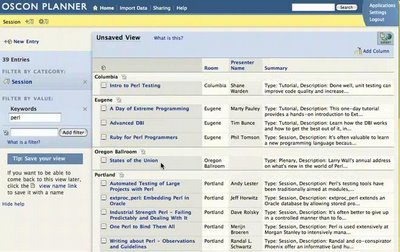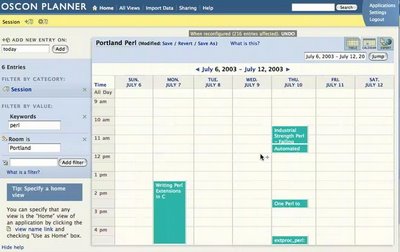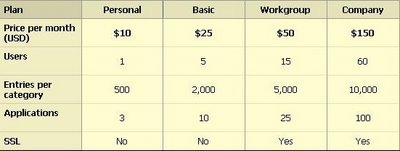Dabble DB: The New Look in Web Databases
In his widely circulated "Internet Services Disruption" memo, Microsoft Chief Technical Officer Ray Ozzie asked—but didn't answer—the following questions:
Note: For more about Ray Ozzie's memo and its Access- and SharePoint-related content, see the "Ray Ozzie's 'Internet Service Disruption' Memo and Microsoft Access" post.
Update 4/19/2006: David Kirkpatrick's "Microsoft's new brain" article for Fortune (April 18, 2006) has this deck: "Brutal competition. A stock going nowhere. Microsoft is in crisis, so Bill Gates has unleashed his new hire, software genius Ray Ozzie, to remake the company - and conquer the Web." The article describes in depth a June 2005 meeting of the top 15 Microsoft executives run by recently hired Ray Ozzie. The article claims that "Put simply, Ozzie's assignment is to Webify everything: To intertwine Microsoft's entire product line - software for consumers, software for businesses, Xboxes, all of it - with the vast and ever-growing power of the Net. 'Everything we do should have a presence on the Web,' Ozzie says."
 SmallThought Systems Inc.'s Dabble DB Web-based data management solution appears to answer most of Ray's questions. What's more, Dabble DB won the Under the Radar: Why Web 2.0 Matters conference's Best In Show award in the "I'd Pay for That" category, as well as the Panelists' Choice and People's Choice awards for the "Make It Easy" category. Under the Radar's venue is Microsoft's Mountain View (Calif.) Campus and Microsoft is one of the show's six Partners and Sponsors.
SmallThought Systems Inc.'s Dabble DB Web-based data management solution appears to answer most of Ray's questions. What's more, Dabble DB won the Under the Radar: Why Web 2.0 Matters conference's Best In Show award in the "I'd Pay for That" category, as well as the Panelists' Choice and People's Choice awards for the "Make It Easy" category. Under the Radar's venue is Microsoft's Mountain View (Calif.) Campus and Microsoft is one of the show's six Partners and Sponsors.
Dabble DB is intended to be the Web-based replacement for ad hoc spreadsheet applications (a.k.a. hacks) that should have used the database model from the git-go. Typical Dabble DB solutions are databases for sales contacts, students and grades, billable time, customer service issues, employee vacation and sick-leave time, event planning, and similar tracking applications. Access 2007 emphasizes user-created tracking application by including templates for many similar solutions. Dabble DB's developers consider Access, FileMaker and QuickBase to be their product's primary competitors.
CrunchNotes' Michael Arrington said on March 11, 2006: "Dabble DB is a service that allows non technical people to set up and use a database, and includes import and export functions to [E]xcel. This is a powerful application, and bridges the gap between Excel and Access or FileMaker."
Dabble DB has just emerged from the beta stage, but a seven-minute QuickTime screen capture—created for the Under the Radar conference—provides an insight into the product's capabilities without requiring registration. If you'd like more details, you can watch a 40-minute QuickTime presentation delivered to the Vancouver (BC) Lisp Users Group. (Dabble DB is written in SmallTalk and uses the Seaside Web applications framework.) Dabble DB's Avi Bryant, the author of Seaside and on the right in this Flickr photo from the conference, promises a two-way Atom API implementation after the public beta starts.
Here's a sample Dabble DB UI for a filtered view of the schedule grouped by the presentation's room for an early O'Reilly OSCON conference (click image for full-size capture):

Brian Benzinger gave Dabble DB a thumbs-up Solution Watch review in early December 2005, and TechCrunch's Nik Cubrilovic wrote a glowing "Dabble DB: Online App Building For Everyone" review on March 11, 2006. Zeke Sneaker, a Vermont-based creative director, looks forward to substituting Dabble DB for Access, Filemaker, and/or SharePoint.
Dabble DB's Web-Based Competitors [Updated 3/25/2006]
Intuit, Inc.'s QuickBase was the first of the online collaborative database management applications and appears to have the largest user base. Over the years, QuickBase morphed from a consumer or small-office/home-office (SOHO) solution priced at US$14.95 per month for up to 15 databases to a department- or enterprise-level service that starts at a minimum of US$249 per month for up to 10 users, 5 MB storage for data, and 100 MB for attachements. Another indication that QuickBase has abandoned the consumer, SOHO, and small to medium-size business (SMB) market is the new emphasis on employing developers and consultants to create solutions with the QuickBase HTTP API. Intuit's Wikipedia entry calls QuickBase a "Web-based corporate workgroup productivity solution."
Serran Technologies, Inc.'s eUnify DB began life in early 2006 as a lower-cost QuickBase competitor targeted to the SMB market. eUnifyDB offers a 14-day free trial and starts at $69.95 per month for up to 5 users with 10 MB database and 1 GB file attachment storage. The Small Business Technology News site gave eUnify DB a brief but favorable review in January 2006.
Caspio, Inc. offers a basic forms-based database solution, Caspio Express DB, that captures data from existing online HTML, Flash, PDF, PDA, and WML forms. Express DB costs $16.95 per month for an unlimited number of forms, plus $0.02 per form submission. The Caspio Bridge Online feature lets you or consultants design and program custom "DataPages." Solution(s) with a total of one to five DataPages cost $39.95 per month, which includes 35 MB storage (in a Microsfoft SQL Server database) and 500 MB data transfer. Tiered pricing tops out at $799.95 per month for 100 DataPages, 600 MB storage and 10 GB data transfer. Caspio Bridge, which has been available since 2001, uses DHTML to create forms and wizards modeled on Microsoft Access. PC Magazine gave Caspio Bridge a favorable review (3 out of five stars) in October 2001.
AMULET Development Corp.'s eCriteria is a low-cost, no-frills Web database publishing system. eCriteria's Standard service (2.5 MB data storage) costs $4.95 per month. The Premium (5 MB, SSL and no banner ads) service is $19.95 per month; Enterprise (10 MB, enhanced security) accounts cost $39.95 per month. eCriteria commenced operation in 2000. eWeek magazine's Michael Caton gave eCriteria a favorable review in February 2004.
Oracle Corp.'s HTML DB site offers Oracle Application Express Studio (formerly HTML DB Studio) for creating forms-based database applications. Oracle offers free HTML DB accounts and a variety of sample solution templates, but creating HTML DB solutions isn't for the faint of heart (i.e., ordinary database users). Applications created on the HTML DB site are for "demonstration purposes only." Developer.com offers a two-part tutorial called "Building Web Applications with Oracle HTML DB."
Google's GoogleBase arrived with much fanfare in mid-November 2005, but the hue and cry quickly subsided when beta participants began testing this free flat-file database. See "Google Base and Atom 0.3 Bulk Uploads," "Google Base and Bulk Uploads with Microsoft Access," "Problems Uploading a Google Base Custom Item Type from a TSV File," and "Google Base and Blogger Items Missing from Google Search" OakLeaf blog entries as examples of issues with the early beta version.
Google says "GoogleBase provides data structure and distribution for a wide range of content and information[. A] subset of items are for sale." GoogleBase's attribute-centric database is better suited for describing items than tracking solutions. GoogleBase items are accessible only through proprietary GoogleBase forms, and you can't design custom forms to display your records. (There's no public API for GoogleBase.) Many types of GoogleBase records—such as items for sale—expire (disappear) in 30 days. Here's a typical example of a GoogleBase form displaying a permanent record with an image (click image for full-size capture):

Click here to open a GoogleBase search results page of OakLeaf blogs and entries.
Advent.Net's Zoho Creator is yet another Web-based tracking application generator that emerged from private to public beta status in early March 2006. Zoho Creator is one of seven Zoho Web applications, which include Zoho Writer, Zoho Virtual Office, Zoho CRM, Zoho Sheet (private beta), and Zoho Planner. These applications are free for a limilted number of users or during their beta cycle. You can listen to or read a transcript of a "Robin Good" interview of Zoho.com's CEO, Sridhar Vembu, to learn more about the Zoho suite. In the meantime, you can find brief Zoho Creator reviews at Shadows in Motion and ITRedux.
Zoho Creator has a minimalist feature set; for example, you can't import existing data. A Zoho representative demonstrated the suite at Under the Radar's "Make It Easy 2.0" session. Search Adam Kalsey's and Ajaxian's session notes for "Zoho." Unlike Dabble DB, the notes indicate that Michael Arrington was unimpressed with Zoho and its products.
Toby Segaran's Lazybase is a simple flat-file web-based list creation and management system. You can create a new database, add tables to it, and then add or edit rows. An interesting feature is a JavaScript generator that lets you embed a read-only view of the data on your own Web page. [Updated April 25, 2006].
Note: Xlinesoft's ASPRunnerProfessional generates ASP (not ASP.NET) pages that run from your Web site and database. While this application doesn't qualify as a Web-based data management system, its presentation techniques—especially for lookup fields and parent-child records—are worth reviewing.
Preliminary Conclusion [Updated 2/25/2006]
Microsoft's Dare Obasanjo, a program manager on the MSN Contacts & Storage team and XML guru extraordinaire, observed in a March 17, 2006 Carnage4Life blog post, "[T]he writing is on the wall that the era of desktop software is coming to an end. I suspect that the folks driving our technical direction like Ray Ozzie and Bill Gates have already accepted this, which is why almost everytime [you] see them giving speeches on our future direction, you hear the magic buzzword services."
As if to prove Dare's point, Bill Gates said in his March 20, 2006 keynote address to the Mix06 conference: "So it's a world of software running on devices, but connecting up to software running on servers, what we often talk about as services. ... It's a variety of business models, new exploration, it's great to see the experimentation, as obviously moving in new levels, transaction fees, subscriptions, one-time payments, all of those make sense, and the platform will facilitate that, give you things to connect up to no matter what your model is."
Here's a corroborating excerpt from Michael Arrington's CrunchNotes from his lunch with Bill Gates on Mix06's first day: "I asked a few questions, specifically about what Microsoft’s plans are around an online version of Office. Bill responded at length without really giving an answer. He did say that he thought people were too infatuated with the thought of an online version of Office, but that they were really focused on the idea of cloud storage for [O]ffice files. This fits right in with their strategies around Office Live, of course." And, obviously, with Google's internal development and acquisition strategies.
Finally (for now), Bill Gates told ZDNet interviewer Martin Lamonica at Mix06: "There was a major demarcation when Ray (Ozzie) put out his memo last year, really saying the primary applications model will have everyone delivering through the Web, monitored through the Web, updating through the Web. And many of these services like storage or authentication that you think of as Active Directory or SharePoint on premise, we've got to get those out (so people can) simply connect up to them. We're making great progress on that." [Check out what more Bill Gates had to say about Ray Ozzie and online applications on page 2 of the interview.]
The arrival of an adequate online, AJAXified, Office-compatible productvity suite is inevitable. It's only a matter of time before someone will assemble the right mix of features, reliability, performance, price, and security to deliver online word processor, spreadsheet, presentation, and database applications that will satisfy 50% or more of today's Microsoft Office Professional users. I bet that Dabble DB could easily handle more than half the current crop of Access 97 to 2003 applications created for individual and business use.
Self-service Web-based data management solutions is a crowded application category.
QuickBase is well-established, but its minimum price of admission is substantially higher than that of current and potential competition. Dabble DB appears to lead the pack in ease of use for simple projects. Dabble DB provides a feature that Access developers have requested since version 2.0—an Outlook-style monthly calendar form—as does Zoho Creator. Here's the Dabble DB version (click image for full-size capture):

The SmallThought folks must keep Dabble DB's entry barrier low enough to whet the interest of casual users (possibly $0.00). On the other hand, volume pricing must be sufficiently high to deliver a viable business plan that satisfies the stability concerns of enterprise-grade customers and the greed of venture capitalists. Whether "I'd pay for that" isn't the issue; the real question is: "You want me to pay how much for that?"
[Update 3/24/2006]
Dabble DB went live with the production version on March 24, 2006, and SmallThought, Inc. announced the following tiered pricing for the service:

SmallThought offers all comers a free 30-day trial of the Basic plan.
An application, which corresponds to a database or workbook, may have any number of categories, which are the equivalent of a table or worksheet. Entries equate to table rows, so you'd expect the Company pricing tier to provide 20,000—not 10,000—entries per category. Preliminary tests with categories having 100 to 2,000 entries indicate that performance might be an issue for categories with several thousand entires.
Stay tuned for a future Dabble DB review with categories created from tables of Microsoft Access's Northwind sample database.
Technorati: Databases DabbleDB Microsoft Access QuickBase eUnifyDB Caspio Express DB Oracle HTML DB Google Base




1 comments:
HyperBase is another contender which has recently entered the fray.
Post a Comment